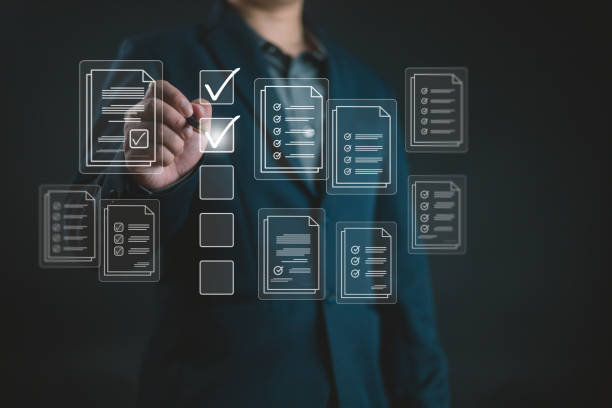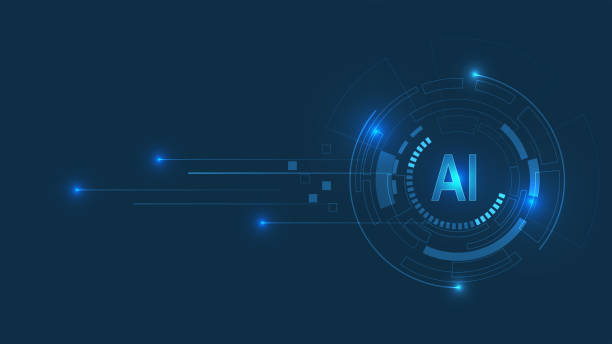What is an AI Robot and How Does It Work?
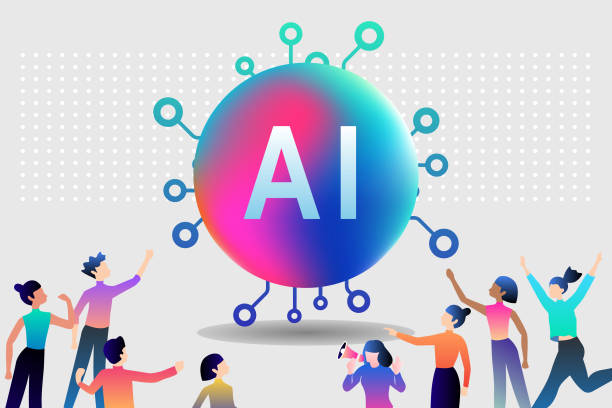
An #AI robot is a combination of two key fields: robotics and #artificial intelligence.
In short, these robots are machines that, using artificial intelligence algorithms, are capable of performing tasks that typically require human intelligence.
The operation of AI robots is such that they first collect data through their sensors.
This data can include images, sounds, temperature, pressure, etc.
Then, this data is transferred to an AI system that uses machine learning algorithms to identify patterns and relationships within the data.
Based on these patterns, the AI system makes decisions and sends commands to the robot to perform specific tasks.
For example, an AI robot used in a factory for product packaging can identify the type of product using its cameras and then correctly package the product using its robotic arms.
AI robots are used in various industries including manufacturing, healthcare, agriculture, customer services, and more.
Does losing customers who visited your site to buy bother you?
Rasaweb is your specialized solution for having a successful online store.
✅ Significantly increase your online sales
✅ Build trust and professional branding with customers⚡ Get free consultation from Rasaweb experts!
Types of AI Robots Based on Application
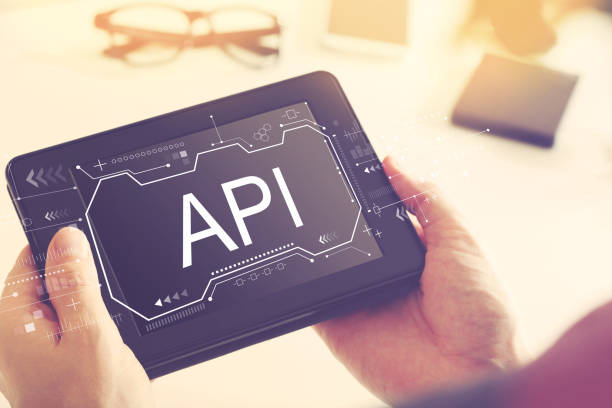
AI robots are divided into different types based on their application.
Some of the most important types of these robots include:
Industrial Robots These robots are used in factory production lines for performing repetitive and precise tasks.
They can perform tasks such as welding, painting, packaging, and assembling parts.
Industrial robots help improve productivity by increasing speed and accuracy in production.
Service Robots These robots are used in service environments such as hospitals, hotels, and restaurants.
They can perform tasks such as transporting items, cleaning, providing information to customers, and serving.
Service robots provide a better experience for customers by offering faster and more efficient services.
AI robots are a type of these robots
Medical Robots These robots are used in operating rooms, laboratories, and pharmacies for performing complex and precise tasks.
They can assist in minimally invasive surgeries, targeted drug delivery, and compounding medications.
Medical robots help improve treatment outcomes by increasing accuracy and reducing human errors.
Advantages of Using AI Robots in Various Industries
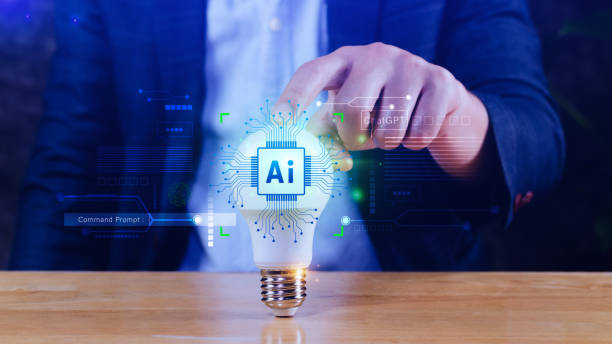
The use of AI robots in various industries offers many advantages.
Some of the most important of these advantages include:
Increased Productivity AI robots can work around the clock without fatigue, significantly increasing productivity.
Reduced Costs By using AI robots, human labor, energy, and raw material costs can be reduced.
Improved Quality AI robots can perform tasks with higher accuracy and quality than humans, thereby improving the quality of products and services.
AI robots contribute greatly in this area
Increased Safety AI robots can work in dangerous and high-risk environments instead of humans, thereby increasing employee safety.
Overall, the use of AI robots can help improve the performance and competitiveness of businesses in various industries.
By offering innovative and efficient solutions, these robots can contribute to the growth and development of industries.
Challenges of Implementing AI Robots
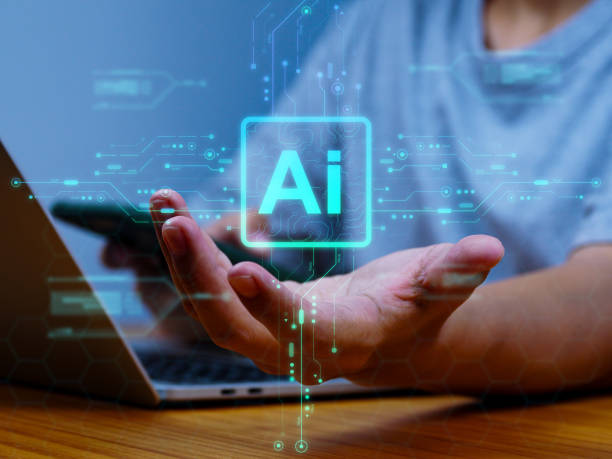
Alongside numerous advantages, the implementation of AI robots also brings challenges.
Some of the most important of these challenges include:
High Cost Purchasing and implementing AI robots can be costly.
Especially for small and medium-sized businesses, this cost can be a barrier to adopting this technology.
Need for Expertise Setting up and maintaining AI robots requires specialized knowledge and skills.
Businesses must hire specialists or train their employees to properly use these robots.
Ethical Issues The use of AI robots can raise new ethical questions.
For example, the question arises whether robots should be responsible for their decisions? Or how can the misuse of this technology be prevented?
Workforce Resistance Some employees may resist the use of AI robots because they fear losing their jobs.
Businesses need to reduce this resistance by providing appropriate training and creating new job opportunities.
Research shows that 80% of customers trust companies with professional websites more. Does your current website inspire this trust?
With Rasaweb’s corporate website design services, solve the problem of customer distrust and a weak online image forever!
✅ Create a professional image and increase customer trust
✅ Attract more sales leads and grow your business
⚡ Get free consultation
The Role of Machine Learning in the Development of AI Robots
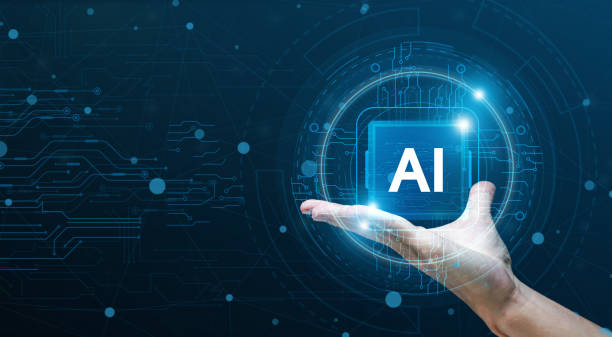
Machine learning is one of the most important components of #artificial intelligence and plays a very significant role in the development of AI robots.
Using machine learning algorithms, robots can learn from data and improve their performance.
AI robot
For example, an AI robot designed for facial recognition can learn from thousands of facial images using machine learning algorithms and increase its accuracy in recognizing faces.
Machine learning algorithms allow robots to perform their tasks without explicit programming.
This is especially important in complex and unpredictable environments.
For example, an AI robot working in a warehouse must be able to automatically find its way and avoid collisions with obstacles.
Using machine learning algorithms, the robot can learn through experience, find the best path, and improve its performance.
In summary, machine learning plays a key role in the development of AI robots, enabling them to perform complex tasks with high accuracy and efficiency.
The Future of AI Robots: Predictions and Possibilities

The future of AI robots is very bright and full of potential.
With the continuous advancement of technology, AI robots are expected to play a more prominent role in our lives in the coming years.
AI robot
Some predictions about the future of AI robots include:
Increased Automation AI robots are expected to automate many repetitive and tedious tasks in various industries in the coming years.
This can lead to increased productivity and reduced costs.
Development of Personal Robots Personal robots are expected to gain more popularity in the coming years.
These robots can help us with daily tasks such as cleaning, cooking, and caring for the elderly.
Integration of Robots with IoT Robots are expected to be widely integrated with the Internet of Things (IoT) in the coming years.
This can lead to the creation of smarter systems capable of collecting and analyzing data and providing better services.
Of course, it should be noted that the advancement of AI robots also comes with challenges.
It is necessary to use this technology responsibly and ethically, taking these challenges into account.
AI Robots in Everyday Life: Practical Examples

AI robots are no longer a science fiction concept; they are already present in our daily lives and help with many tasks.
Here are a few examples of AI robot applications in everyday life:
Voice Assistants Voice assistants like Siri, Google Assistant, and Alexa use #artificial intelligence to understand and respond to voice commands.
They can perform tasks such as playing music, setting alarms, answering questions, and controlling smart devices.
Self-Driving Cars Self-driving cars use AI robots to drive without human intervention.
They use sensors, cameras, and radars to identify their surroundings and make necessary decisions for safe driving.
Now we want to create an attractive table
Robotic Vacuum Cleaners Robotic vacuum cleaners use artificial intelligence to clean the house automatically.
They can navigate their way around the house and avoid collisions with obstacles.
Service Robots in Restaurants Some restaurants use service robots for greeting customers, delivering food, and cleaning tables.
| Application | Description |
|---|---|
| Voice Assistants | Playing music, setting alarms, answering questions |
| Self-Driving Cars | Driving without human intervention |
| Robotic Vacuum Cleaners | Automatically cleaning the house |
| Service Robots | Greeting customers, delivering food |
These are just a few examples of AI robot applications in everyday life.
With technological advancements, AI robots are expected to play a more prominent role in our lives in the future and help with many other tasks.
AI robot
Impact of AI Robots on the Job Market
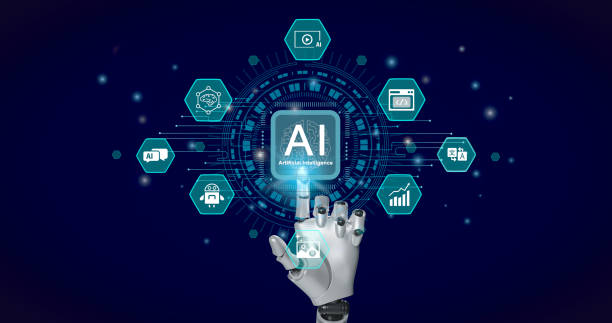
One of the most significant concerns regarding AI robots is their impact on the job market.
Some people fear that robots will replace humans and lead to widespread unemployment.
AI robot
However, it should be noted that this issue is more complex.
On the one hand, AI robots can eliminate some jobs, but on the other hand, they can also create new jobs.
For example, with the increased use of industrial robots, the need for labor in production lines may decrease.
But at the same time, the demand for specialists to design, set up, and maintain these robots will increase.
Furthermore, AI robots can increase productivity and lead to economic growth.
This economic growth can create new job opportunities in other sectors.
Therefore, the impact of AI robots on the job market is a complex issue that requires careful consideration.
Governments and businesses need to help individuals adapt to these changes by providing appropriate training and creating new job opportunities.
Does your company’s website create a professional and lasting first impression in the minds of potential customers? Rasaweb, with professional corporate website design, not only represents your brand’s credibility but also opens a path for your business growth.
✅ Create a powerful and trustworthy brand image
✅ Attract target customers and increase sales
⚡ Get free consultation
Ethical Issues Related to AI Robots
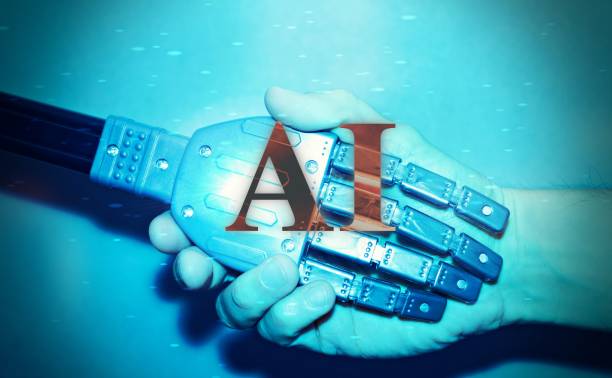
The development of AI robots raises new ethical issues that need to be addressed.
Some of the most important of these issues include:
Accountability If an AI robot makes a wrong decision and causes damage, who will be responsible? The robot’s designer, the robot’s owner, or the robot itself? These questions still have no definitive answers.
Privacy AI robots collect a lot of data.
How can the misuse of this data be prevented and individuals’ privacy be protected?
Bias AI algorithms may make discriminatory decisions due to biases present in the training data.
How can these biases be prevented?
Human Replacement Should robots replace humans? And if this happens, what will be its impact on society?
These are just a few examples of ethical issues related to AI robots.
It is necessary to discuss these issues and find appropriate solutions for them.
AI robot
Now we will create another table as a concluding remark.
| Ethical Issue | Description |
|---|---|
| Accountability | Who is responsible if the robot makes a wrong decision? |
| Privacy | How to prevent misuse of data collected by robots? |
| Bias | How to prevent discriminatory decisions by robots? |
| Human Replacement | Should robots replace humans? |
How to Prepare for Entering the Field of AI Robots?

If you are interested in the field of AI robots and want to enter it, you need to acquire specific skills and knowledge.
Some of the most important of these skills and knowledge include:
Programming Familiarity with programming languages such as Python, C++, and Java is essential.
These languages are used to develop AI algorithms and control robots.
AI robot
Mathematics Knowledge of mathematics, especially linear algebra, calculus, and statistics, is essential for understanding and developing AI algorithms.
Artificial Intelligence Familiarity with AI concepts and techniques such as machine learning, neural networks, and natural language processing is essential.
Robotics Familiarity with the principles of robotics, including robot design, robot control, and sensors, is essential for working with AI robots.
Soft Skills In addition to technical skills, soft skills such as problem-solving, critical thinking, and teamwork are also essential for success in this field.
AI robot
You can acquire these skills and knowledge by participating in training courses, studying books and articles, and undertaking practical projects.
Frequently Asked Questions
| No. | Question | Answer |
|---|---|---|
| 1 | What is an AI robot? | An AI robot is a machine capable of understanding, reasoning, learning, and problem-solving, and can perform complex tasks with relative autonomy. |
| 2 | What are the most important applications of AI robots? | Key applications include industrial manufacturing, customer services (chatbots), medicine and surgery, autonomous transportation, space exploration, and military affairs. |
| 3 | What is the main difference between an AI robot and a regular robot? | A regular robot only follows programmed instructions, while an AI robot can learn from data, make decisions, and adapt itself to new environments. |
| 4 | How do AI robots learn? | They learn by identifying patterns and improving their performance through machine learning algorithms (such as deep learning, reinforcement learning) and processing vast amounts of data. |
| 5 | Can AI robots have emotions? | Currently, AI robots do not possess real emotions in the human sense. They can imitate or detect emotions, but they do not understand or experience them. |
| 6 | What are the current limitations of AI robots? | Limitations include the need for large amounts of data, inability to understand abstract concepts, lack of true creativity, ethical issues, and challenges of generalization in new environments. |
| 7 | What is the role of AI in the development of humanoid robots? | AI helps humanoid robots walk, maintain their balance, perceive their surroundings, interact with humans, and perform complex tasks. |
| 8 | How is the future of AI robots predicted? | It is predicted that AI robots will become smarter, more autonomous, and capable of performing more complex tasks in daily life and industry, and their interaction with humans will increase. |
| 9 | Can AI robots replace all human jobs? | It is unlikely that all human jobs will be replaced. Robots will take over many repetitive and dangerous tasks, but jobs requiring creativity, empathy, and ethical judgment will remain. |
| 10 | What ethical and social challenges arise with the expansion of AI robots? | Challenges include issues related to privacy, data security, ethical decision-making by robots, impact on employment, and accountability in case of errors. |
And other advertising services from Rasaweb Advertising Agency
- Smart Custom Software: A fast and efficient solution to increase website traffic with a focus on optimizing key pages.
- Smart Website Development: A dedicated service for online growth based on precise audience targeting.
- Smart Customer Journey Map: A combination of creativity and technology for digital branding through key page optimization.
- Smart Sales Automation: An innovative platform for improving customer acquisition with custom programming.
- Smart Website Development: A fast and efficient solution for user interaction focusing on marketing automation.
And over hundreds of other services in the field of internet advertising, advertising consulting, and organizational solutions.
Internet Advertising | Advertising Strategy | Advertorials
Sources
AI Robots and the Future of Humanity
Artificial Intelligence: A Comprehensive and Practical Guide
Familiarity with Types of Smart Robots
The Impact of Artificial Intelligence on Everyday Life
? For a powerful presence in the digital world and sustainable growth of your business, Rasaweb Afarin Digital Marketing Agency is your reliable partner, offering services such as WordPress website design, SEO, and social media management.
📍 Tehran, Mirdamad Street, next to Bank Markazi, Kazeroun Jonoubi Alley, Ramin Alley, No. 6

